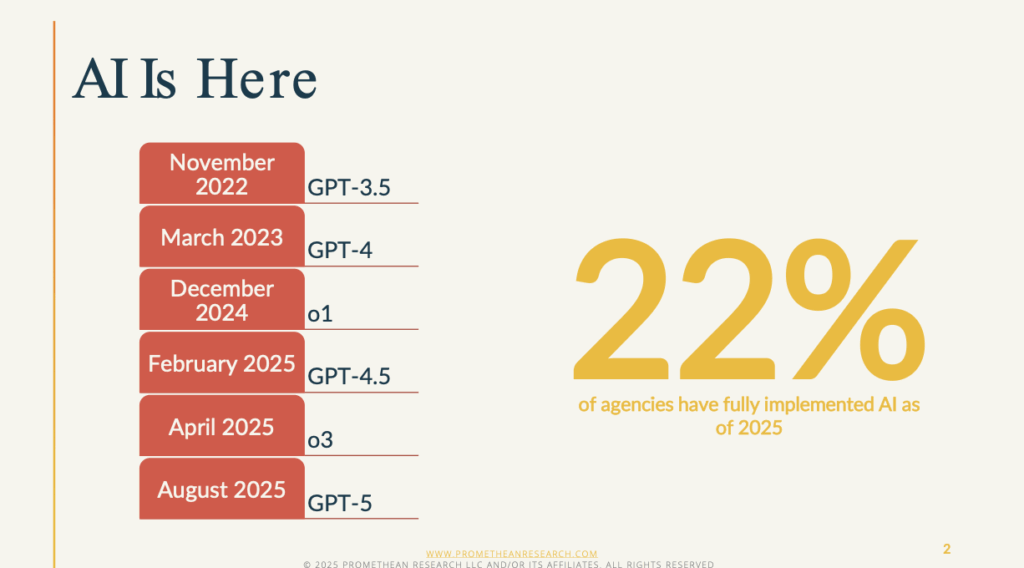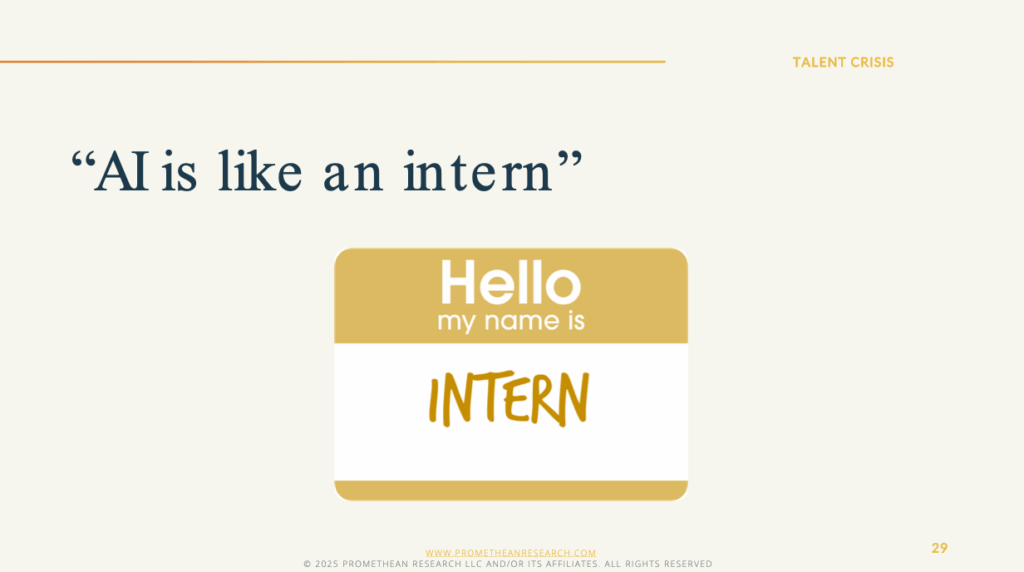
At GatherUp’s Back to School 2025 event, one session stood out for agency leaders everywhere: Rethinking the Agency Model: How AI Is Redefining Value in 2025. Led by Nick Petroski, founder of Promethean Research, the session explored how artificial intelligence is reshaping the economics, structure, and identity of digital agencies. Petroski has spent more than a decade studying agency performance and strategy, analyzing data from over 100,000 firms worldwide. His research reveals what many are feeling already, AI is changing the game, but not everyone is playing it the same way.
Where agencies stand with AI
While most agencies recognize AI’s potential, only a fraction have truly built it into their workflows. Those that have are already seeing measurable gains, while others are still experimenting or developing plans.
Here’s the breakdown:
- About 20% of agencies have fully implemented AI.
- Another 20% are mid-implementation and testing across workflows.
- 50% are still in planning mode, trying to decide where to start.
Agencies using AI effectively are seeing productivity gains of 10–40%, which in some cases doubles profit margins. These firms aren’t just saving time; they’re reinvesting that time into strategy, client experience, and innovation. For the rest, progress is slower. Clients, however, are already acting as if AI is everywhere. They expect faster delivery, lower costs, and flawless quality. That mismatch between expectation and reality is putting pressure on agencies that haven’t built a clear AI plan.

Takeaway: Start small. Pick one workflow, like reporting, review response, or content ideation, and systemize it. The goal isn’t perfection; it’s progress.
From execution to strategy
AI has changed what clients value. Tasks like writing, coding, or creating reports can now be automated or accelerated. The real opportunity lies in the thinking behind the work, the strategy, creativity, and expertise that machines can’t replicate.
What clients now expect from agencies:
- Guidance on what to do, not just how to do it.
- Direction on which channels, messages, and tactics matter most.
- Confidence that their strategy aligns with long-term business goals.
As Petroski explained, “AI can tell you to create content. It can’t tell you whether that content should exist.” Agencies that position themselves as strategic partners, helping clients make better decisions, are the ones building lasting trust and higher-value relationships.
Takeaway: Lead with insight, not output. Make strategy the core of your value, and use AI as a supporting tool to bring ideas to life faster and smarter.
AI and the new economics of agencies
AI isn’t just changing how agencies work; it’s changing their bottom line. For those who have implemented it well, the financial results are dramatic.
AI-driven agencies are:
- Increasing productivity while maintaining team size.
- Improving net margins by up to two times compared to 2023 averages.
- Using saved time to focus on client strategy and acquisition.
Meanwhile, two-thirds of agencies report client pricing pressure based on the perception that AI should make everything cheaper. This has created a divide between agencies that are gaining ground through efficiency and those falling behind without a plan.
Takeaway: Be transparent. Explain how AI supports your workflow, where human oversight remains, and how it enhances quality. Transparency builds credibility and helps set realistic expectations.
The looming talent gap
AI is also reshaping agency hiring trends. With many entry-level tasks now handled by automation, opportunities for new talent are shrinking. That could have long-term consequences.
Key concerns:
- Entry-level hiring has dropped across digital and tech sectors.
- Fewer young professionals are getting real-world training.
- Mid-level expertise may thin out in the next 3–5 years.
Forward-thinking agencies are responding by investing in apprenticeship programs and mentorship tracks. These programs are small in scope but crucial for developing human judgment, creativity, and leadership.
Takeaway: Don’t rely solely on automation. Continue developing people who can think critically, make judgment calls, and connect authentically with clients.

The new agency model
AI isn’t replacing agencies, it’s redefining them. The winners will be the ones who combine automation with human insight and reposition themselves around strategy, trust, and creativity.
What successful agencies are doing now:
- Building clear AI workflows into project delivery.
- Offering transparency about how AI supports their process.
- Shifting focus from production to advisory and strategy services.
- Training teams to use AI responsibly and creatively.
As Petroski summarized, “AI isn’t the story. What you do with it, reliably, safely, and profitably, is.”
Final Takeaways
If you’re leading an agency in 2025, here’s how to stay ahead:
- Start implementing now. Don’t wait for the perfect AI plan, test and adapt.
- Lead with strategy. Your insight is what clients can’t automate.
- Be transparent. Show how AI fits into your process and improves outcomes.
- Invest in people. Apprenticeships and mentorship will future-proof your team.
- Balance tech with trust. Automation adds speed, but human judgment wins clients.
AI isn’t the end of the agency model; it’s the next evolution of it. The agencies that thrive won’t be the ones that automate everything; they’ll be the ones that use AI to sharpen their thinking, strengthen relationships, and redefine what great digital work looks like.
Watch the Full Session
Ready to Build the Future of Your Agency?
GatherUp helps agencies scale smarter by combining AI-powered tools with the human touch that drives lasting client trust. Start using a platform built for the next generation of digital growth.
👉 Book a demo or Learn more about GatherUp for Agencies
